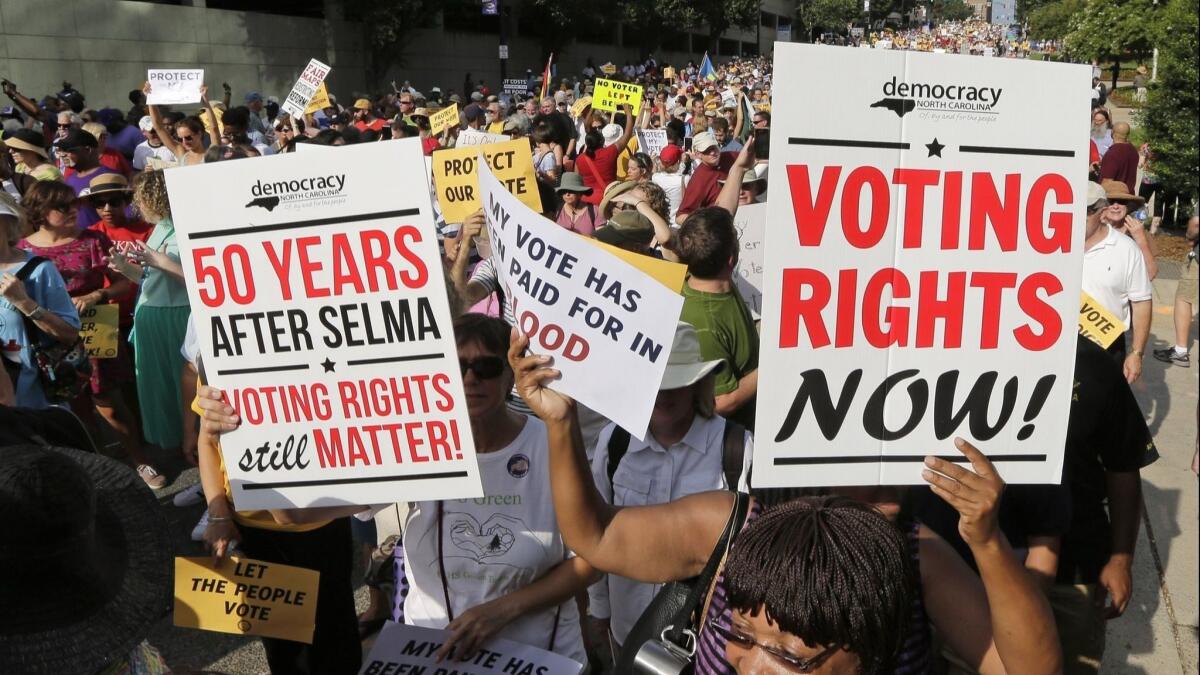Editorial: A clarion call to restore protections of the Voting Rights Act

- Share via
Five years after the Supreme Court gutted a key provision of the 1965 Voting Rights Act, a new report from the U.S. Commission on Civil Rights has confirmed predictions that the ruling would hobble enforcement of that landmark law.
In addition to prohibiting racial discrimination in voting nationwide, the Voting Rights Act requires states and localities with a history of discrimination — most of them in the South — to “pre-clear” changes in their election procedures with the U.S. Department of Justice or a federal court.
In its 2013 decision in Shelby County vs. Holder, however, the court declared unconstitutional the formula Congress had established to determine which states would have to submit to pre-clearance, effectively shutting pre-clearance down. Writing for himself and four other conservatives, Chief Justice John G. Roberts Jr. said that the formula was obsolete because “things have changed dramatically” since the Voting Rights Act was first enacted in 1965. It was a disastrous decision.
The term ‘judicial activism’ is thrown around, but if a decision ever deserved it, Shelby County did.
The term “judicial activism” is thrown around, but if a decision ever deserved it, Shelby County did. The Constitution authorizes Congress to enforce the provisions of the 15th Amendment — which guarantees the right to vote without regard to “race, color, or previous condition of servitude” — by enacting “appropriate legislation.” In 2006 Congress voted to extend the Voting Rights Act’s coverage formula for an additional 25 years in legislation signed by President George W. Bush. Despite that, the court threw it out.
The Civil Rights Commission report, “An Assessment of Minority Voting Rights Access in the United States,” makes it clear why the court should have deferred to Congress’ judgment that extending the coverage formula would protect gains already made and prevent states from relapsing into discriminatory practices.
The report notes that within two hours of the decision, Texas’ attorney general tweeted that the state would reinstitute a strict photo ID law, which had been previously struck down by a court during the pre-clearance process. The day after the ruling, North Carolina’s legislature voted to make its voter ID law stricter, and eliminated or restricted rules that had made it easier for minorities to vote. The report notes that both states’ actions were ultimately found by courts to be acts of intentional racial discrimination, but only after years of litigation. It almost certainly wouldn’t have come to that if the old pre-clearance formula had remained in place.
The report mentions other consequences of ending pre-clearance, such as the fact neither the Justice Department nor voters any longer receive notice of changes in voting procedures. That shifts the burden of monitoring election changes to voting rights groups, and imposes a large burden on communities, “who must now stretch limited resources to track changes themselves in the absence of government transparency,” the report says.
Enter the Fray: First takes on the news of the minute from L.A. Times Opinion »
In its Shelby County decision, the Supreme Court left open the possibility that pre-clearance could resume if Congress legislated a new formula that more accurately reflected recent patterns of discrimination. Responding to that invitation, Sen. Patrick Leahy (D-Vt.) has introduced the Voting Rights Advancement Act, which would automatically subject a state to pre-clearance if 15 or more voting-rights violations had occurred there over the last 25 years (or 10 violations if one was committed by the state government itself).
The Civil Rights Commission would go even further. It proposes that Congress create “a streamlined remedy” to review potentially discriminatory changes in election procedures before they go into effect — even, the report suggests, “in jurisdictions that do not have extensive histories of discrimination.”
The obstacle to accomplishing these or any other reforms isn’t constitutional; it’s political. In Congress (as in state legislatures) Republicans have a vested interest in restrictions — such as unnecessary requirements for photo ID at the polls — that disproportionately make voting harder for minorities who tend to support Democrats. Unless Republicans have a change of heart — or unless they lose control of Congress — it will be impossible to undo the damage caused by the Supreme Court.
Follow the Opinion section on Twitter @latimesopinionand Facebook
More to Read
A cure for the common opinion
Get thought-provoking perspectives with our weekly newsletter.
You may occasionally receive promotional content from the Los Angeles Times.










